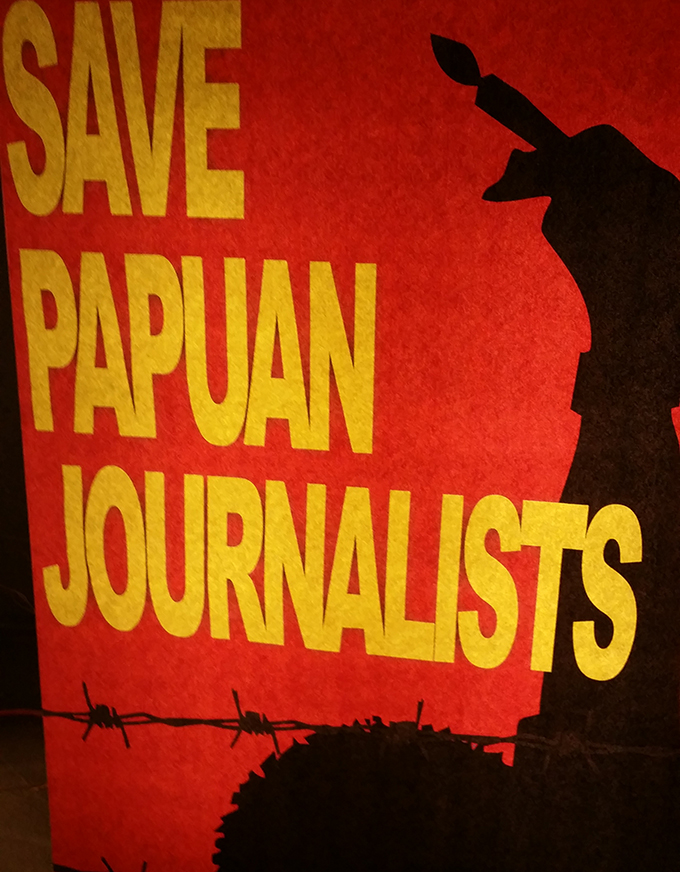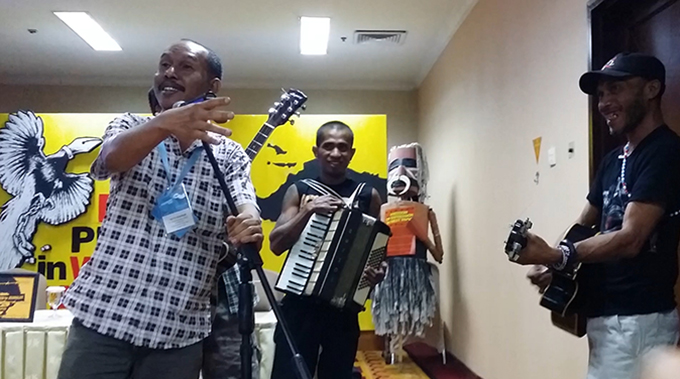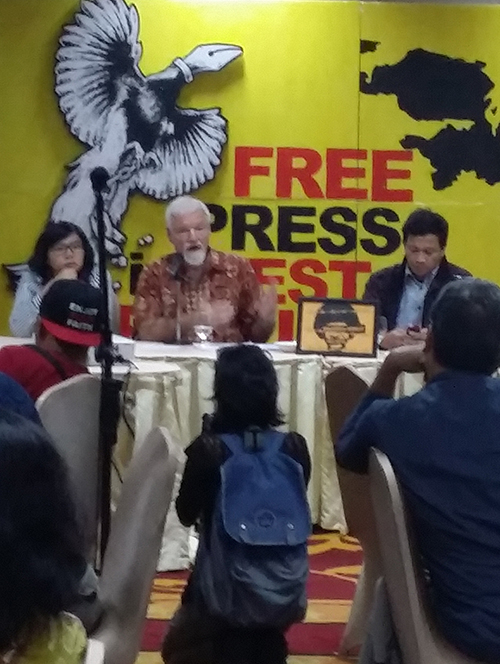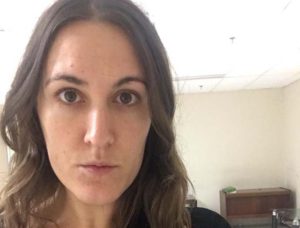
ANALYSIS: By David Robie
Indonesia recently hosted a bold public relations window-dressing expo in Auckland presenting itself as a “Pacific” nation while attempting to provide an unconvincing impression of normality in the two Melanesian provinces known collectively as West Papua.
Indonesian Foreign Minister Retno Marsudi hailed “a new era of Pacific partnership – a Pacific Elevation” while New Zealand’s counterpart Winston Peters responded to human rights questions with a remarkably naïve statement that Indonesia was “making progress” by welcoming a press pack to West Papua.
Nothing could be further from the truth. Papuan critics have dismissed this Pacific Expo as effectively “fake news” – a cover-up of more than a half-century of repression and distortion.
READ MORE: ‘It opened my eyes’: The Indonesian woman fighting for West Papuan rights
Frequent reports from human rights agencies have detailed a litany of abuse, violence and repression tantamount to “slow genocide”, as at least one author has described it.
The atrocious current conditions in West Papua were highlighted yet again last week with a report by the relief aid group Solidarity Team for Nduga claiming that at least 139 people have died in internal refugee camps in the Highlands of West Papua and more than 5000 people have been displaced since renewed fighting broke out between the Indonesian military and West Papua pro-independence rebels last December.
Among the latest human rights violation reports has been a document presented to Britain’s House of Commons Foreign Affairs Committee last month.
Prepared by researcher Pelagio Da Costa Sarmento of the respected London-based Indonesian human rights agency Tapol and editor Victor Mambor of the Jayapura-based newspaper and website Tabloid Jubi, the submission was in response to an inquiry by the Commons Select Committee into the Foreign and Commonwealth Office (FCO) and Global Media Freedom in an effort to combat disinformation.
A covering declaration accompanying the submission made it clear it was exposing the current state of lack of media freedom in West Papua.
“Over the last 10 years, journalists and news organisations have faced serious threats to their personal security, as well as being targeted by digital disinformation campaigns that aimed to disrupt the work of legitimate news sources and reporting,” the declaration said.
“The death of two local journalists, assaults on multiple others and several cases of international journalists being deported from Indonesia for reporting on or in West Papua underscores the lack of media freedom of West Papua.”
Promises not kept
Indonesia ranks 124th out of 180 countries in the Reporters Without Borders Global Press Freedom Index, which states “President Joko ‘Jokowi’ Widodo did not keep his campaign promises during his five-year term.
“His presidency was marked by serious media freedom violations, including drastic restrictions on media access to West Papua … where violence against local journalists keeps on growing.”

Victor Mambor and I shared the podium in an “alternative” media freedom forum in Jakarta at the time of the UN World Press Freedom Day conference in May 2017 and my Media Asia article about the crisis outlined efforts to “gag” discussion about media freedom in West Papua.
Mambor has been a strong advocate for the Alliance for Independent Journalists (AJI) over the West Papuan media freedom cause.
The submission by Tapol and Jubi declares:
- There are patterns of threats that implicate the safety and security of local journalists in West Papua.
- A clearing house, “an intricate red-tape”, was re-introduced in May 2019 to select foreign journalists coming to West Papua. (Once a permit is granted, security forces supervise the selected journalists during their work in West Papua).
- Over the past 10 years, there have been two deaths, multiple assaults, arrests on local journalists and deportation of international journalists. (Most of the cases remain open with no clear investigation process).
- Disinformation using bogus online media disrupts the work of legitimate news sources.

Human rights violations
“West Papuans have been experiencing serious human rights violations including torture, imprisonment and extrajudicial killings by the Indonesian security forces (police and military),” the submission says.
“The West Papuans have long expressed their desire for self-determination since Indonesia took over the territory in 1963. It was officially incorporated into the Indonesian state in 1969 after the ‘Act of Free Choice’.
“Simmering low level conflict between various pro-independence groups and the Indonesian army have been ongoing since then, with the continued existence of local armed groups in West Papua. Indonesia has maintained a significant military presence in the region.”
However, in recent years “civil resistance movements have gained traction organising protests against human rights violations in West Papua and demanding the right to self-determination”.
The submission says that as a result the Indonesian government has “tightened security control over West Papua by maintaining the presence of both military and police forces and deploying these state security forces to stop rallies or discussions on human rights and/or political issues, and clamp down on the freedoms of expression, association, and assembly”.
Human rights violations and extrajudicial killings by the military and police in West Papua “rarely make the headlines in the mainstream media,” says the submission.
There have been many cases since where access to foreign media has been limited or refused. There have also been several cases of foreigners visiting West Papua being deported from Indonesia “on suspicion of being journalists”.
Relaxed media rules
While four journalists from New Zealand (from RNZ Pacific and Māori Television) took advantage of a brief period of relaxed media rules in 2015 after President Widodo took office to visit West Papua, none have been there since.
In May 2019, the head of the immigration division in the regional office of the Ministry for Law and Human Rights in Papua Province reaffirmed a “clearing house” system for any foreign journalists wanting to visit West Papua.
If a permit is granted the foreign journalist would then be supervised by the security forces during their entire working trip in West Papua.
Here is a list of human rights violations against journalists documented by Tapol and Jubi researchers over the past decade:
Local journalists:
2010: Journalist Ardiansyah Matrais, a correspondent for Jubi and Merauke TV, was reported missing on July 28. Two days later, his tortured body was retrieved from the Gudang Arang Merauke river. The police autopsy report said he was still alive when he had been thrown into the river. His case remains unresolved.
2011: Journalist Banjir Ambarita, correspondent of the Jakarta Globe daily and Vivanews.com, was stabbed while driving a motorbike. It is suspected that the motive was related to an article he had written on the sexual abuse of a detainee by three police officers. No further investigation undertaken.
2012: Leiron Kogoya, a journalist for Pasific Post and Papua Pos Nabire, died when gunmen plane shot down his plane at an airport in Papua province. Though he was not specifically the target, his death served as a reminder of the dangers that journalists face in West Papua.
2015: Abeth You, a journalist writing for Jubi was attacked by police in October when covering a demonstration on human rights violations in West Papua.
2017: Journalist Ardi Bayage, a reporter for Suarapapua.com, was arrested when covering a protest during World Press Freedom Day in 2016. Bayage showed his press card to the police, however the police ignored and accused him of lying. He was held for several hours in the police headquarters in Jayapura.
2018: Journalist Abeth You of Jubi in May captured the police beating his colleague Mando Mote on his mobile phone. He was choked by a member of the police; his mobile phone was taken away and his press card was destroyed.
Foreign journalists:
2006: Five Australian journalists from Channel Seven were detained and put under surveillance in Jayapura, Papua province, and then deported. Naomi Robson, Rohan Travis, Peter Andrew, Paul Richard and David John were detained on charges of entering the province with tourist visas. They were forced on a flight back to Jakarta on September 14 from where they were expelled from the country.
2014: Two French journalists, Thomas Dandois and Valentine Bourrat, were detained in August in Papua province. They were doing a report on West Papua for the Franco-German TV channel Arte. They were charged with violation of immigration regulations and promoting instability. Their local guide and interpreter were also arrested and interrogated by the police for 36 hours.
2016: A visa was denied for French journalist Cyril Payen to report in Papua. On January 8, the Indonesian Embassy in Bangkok informed Payen that his application for a visa to visit Indonesia and carry out reporting in Papua province had been denied. The Indonesian Ministry of Foreign Affairs officials later informed the French Embassy in Jakarta that the denial was because his previous reporting on the pro-independence movement was “biased and unbalanced”.
2017: French journalist Basil Longchamp and his camera crew were deported from Indonesia after being granted permission to work on a documentary in Indonesia covering West Papua. On their arrival in Indonesia, they were expelled and banned from returning to Indonesia.
2018: Rebecca Henschke, an Australian journalist working for the BBC and her crew received an official permit to cover a military aid operation in West Papua. However, when the authorities found out about her Twitter post showing troops providing only non-nutritious foodstuffs, the journalist and her crew were expelled on the grounds that her post “hurt the feelings” of the soldiers.

2018: Australian doctoral candidate Belinda Lopez doing Indonesian studies at Macquarie University, Sydney, was detained in Denpasar, Bali, after arriving from Australia for her honeymoon in Indonesia.
“She was also planning to visit West Papua to attend a festival. Immigration officials told her that her name was blacklisted without offering any justification She had formerly worked as a reporter in Jakarta and had already been deported from West Papua once in 2016 on suspicion of being a journalist.”
The researchers said the evidence demonstrated “acute risks and barriers for journalists working in West Papua”.
‘Bogus online media’
The submission also declared that West Papua suffered from the existence of “bogus online media”.
According to a 2018 investigation by Jubi and a Jakarta-based website, Tirto, there were about 18 online media platforms that were “dubious and bogus”.
“Their style of reporting includes producing hoaxes and propaganda regarding West Papua, quoting fictitious sources and conveying strong bias in favour of the police and the military in West Papua,” stated the submission.
“Their work severely disrupts the work of genuine media organisations which also have an online presence. They make a major contribution to the spread of disinformation to the public regarding the issues in West Papua.
“They also affect the work of civil society organisations that have limited access to the region, and that rely on the online news reporting that comes out of West Papua.”
In their report, Tapol and Jubi cite an example of how a bogus online media had “disrupted critical humanitarian work”.
Describing the difficulties in verifying information and human rights violations allegedly taking place in Nduga regency, in the Central Highland of West Papua, the submission explains how Indonesian police and military have been conducting a joint operation against the West Papua Liberation Army since last December.
Nduga lockdown
“Independent sources have been very difficult to reach, and the military has been the sole source of information. Any accounts differing from the military are declared as a hoax, whereas not a single press worker can access Nduga due to the lockdown,” states the submission.
“A local Papuan senator was reported to police when he stated that there were civilian deaths resulting from the operation. This makes balanced and accurate reporting from the ground nigh on impossible.
“It is also undermining the image of a free and fair media in Indonesia – one of the largest democratic nations in the world. There is very limited accountability on the part of the authorities towards the ongoing human rights crisis in West Papua.”
In the past two UN Universal Periodic Reviews of Indonesian human rights, New Zealand and France have called for Indonesia to respect press freedom and open access to national and international journalists to West Papua.
Call for protection
Among recommendations by Tapol and Jubi are:
- The United Kingdom – as host of the recent Global Media Freedom conference – should ensure freedom of the press is upheld universally, including in West Papua.
- Indonesia ought to “maintain its credibility” by providing access to national and international media so that they can provide unrestricted coverage in West Papua.
- Indonesia should be pressed to protect journalists working in West Papua and ensure that they are free from any harassment by security forces.
- Indonesia must bring to justice those responsible for attacks and killings of journalists in West Papua.
- Development aid funding should be increased to strengthen capacities of local organisations, media outlets, and journalists in West Papua, and to enable greater transparency and credible documentation of the ongoing human rights crisis in West Papua.
- More West Papua reports
- Pacific media freedom and news ‘black holes’ worsen
- Māori Television’s Native Affairs in West Papua
- Tapol
- Tabloid Jubi











































